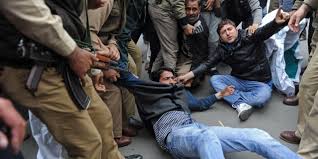Kashmir is simply not an issue of dispute between India and Pakistan but today it is an issue of humanity versus brutality.
Kashmir, the largest militarised zone in the world with more than 700,000 Indian boots carrying and using lethal weapons with impunity under the legal protection known as AFSPA, Armed Forces Special Powers Act.
This gives Indian forces a free hand to do what they will without any accountability. AFSPA enables the military to carry out gross human rights abuses that include enforced disappearances, torture, rape, sexual abuse and cold blooded murder.
The latest series of violence began on 1 April 2018 when Indian military unleashed forces in the name of ‘operation against militants’ locally known as crackdown in Shopian and Anantang district of Kashmir Valley, killing 13 and wounding 70 Kashmiris.
When protesters took to the streets against the atrocities committed by Indian forces, the army fired at them with pellet guns and rifles using live ammunition into the unarmed crowd in the village of Draged-Sugan.
People came out in large numbers throughout the valley to protest, more deaths and injuries. Numaan, a university student who was wounded said, “We support the freedom fighters against Indian occupation.”
Numaan reflects the sentiments of a generation who grew up seeing only miseries of curfews and deaths.
The protest spread throughout the valley and families continued to receive dead bodies while hospitals and doctors were struggling to cope with the injured ones. The officials confirmed that the injured sustained bullet wounds or pellet injuries.
While world was observing Easter Monday, Indian-occupied Kashmir was bleeding. Indian forces continue to use pellets in order to blind a generation in Kashmir.
Both pro-Indian ruling parties as well as pro-freedom parties’ leadership raised their voice against the use of pellet guns by the Indian military.
Indian army claims that it is a ‘non-lethal weapon’ but doctors treating the pellet victims say it maims a person forever.
By now, the valley has had thousands of pellet victims from children to the elderly.
Apple-rich southern districts of Kashmir became volatile after 21 year old Burhan Muzzafar Wani, a charismatic youth was murdered by the Indian Army on 8 July 2016 while he was spending time with family after Eid in his village Tral.
Today Burhan is a hero whose name is visible everywhere on the walls of Kashmir.
According to Sydney Morning Herald, Kashmiri youths have displayed open solidarity with pro-independent fighters despite the worst counter-insurgency operations in recent times.
Thousands gather to attend the funerals when the authorities hand over the body bags. Thousands of Kashmiris hit the streets demanding an end to Indian rule over Kashmir. Most Kashmiris support the freedom movement and participate in street protests against Indian occupation.
Atta Malik says that India is using brutal military approach for what is a political and humanitarian problem.
Kashmiris either will die or be forced to pick up arms, said Mirwaiz Umar Farooq, a charismatic voice of freedom movement.
As usual, the authorities stopped train services and cut mobile and internet connections to stop anti-India protests, a normal practice in Kashmir.
Government ordered all schools and colleges are closed to avoid such anti-India protest.
Meenakshi Ganguly writes that since in India’s current hyper-nationalist environment, many right-wing groups consider any support for Kashmiri human rights to be anti-national.
Life in Kashmir has changed, women in the Valley were safer and people had safer marriage functions and nightlife. Marriages were celebrated traditionally during late night until 18 May 1990.
On that fateful night Mubeena Akhtar (18) a bride was gang raped by Indian Border Security Forces (BSF) on her wedding night along with her pregnant aunt Amina while they were returning home with the barat (marriage party) on bus number JKF 1373.
The Guardian has reported quoting International Committee of the Red Cross (ICRC) intelligence that India operates several torture camps throughout Kashmir Valley.
Today history of Kashmir is written with the blood of innocent Kashmiris as rape, torture and murder continue.
Hanif Bismi





